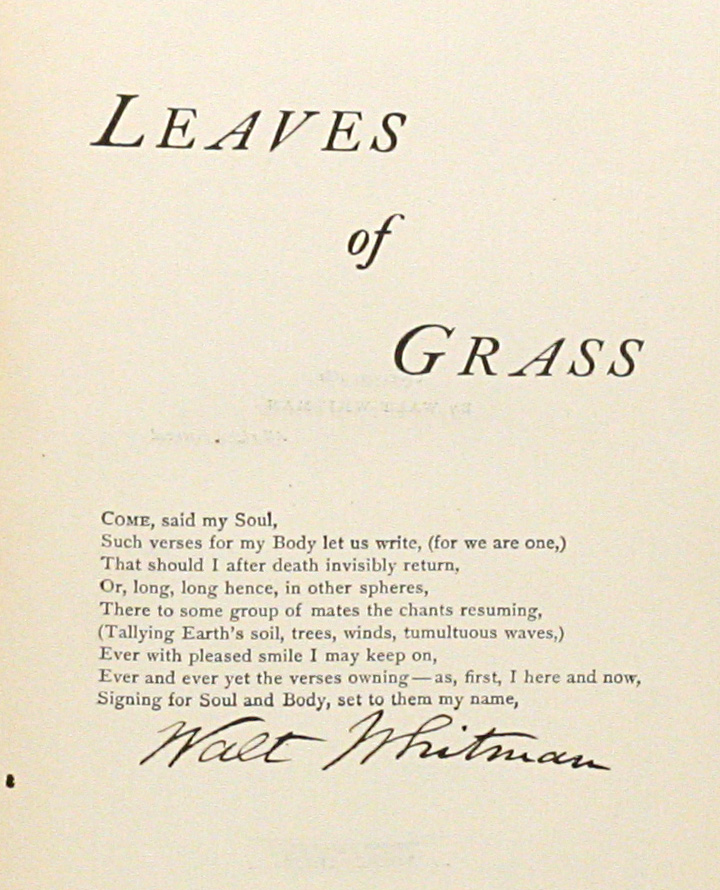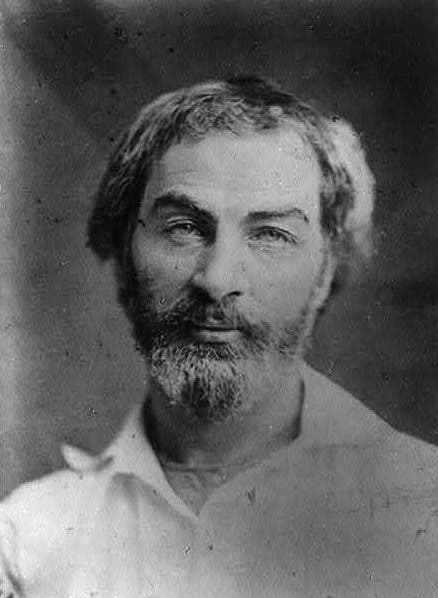Good Reads meta-data is 624 pages, rated 4.1 by 81,342 litizens.
Genre: Poetry

Verdict: Exhilarating!
To say that Whitman’s poetry is exhilarating is just a start. It zips, it dips, it soars, it flies, it ponders, it races in a cascade of verse. About 400 poems are combined in this book, which began as a collection of twelve, and became his life’s work as he revised, edited, amended, and augmented it.
It also departed from the conventions of poetry in its celebration of the immediate, material world and the human body in contrast to the mannered abstraction that prevailed at the time. The verse is blank, by the way, and rhymes are few and far between, and that also made it odd. For its time it was also explicit about sex, and implicit about homosexuality.
No one in the literary establishment would touch it in 1855, as a consequence he printed it himself in the 95-page first edition. (One sold in 2014 for $US 305,000.)
The narrative voice is without a doubt Whitman himself (and sometimes that is explicit in the verse) as he surveys man, woman, child, beast, and nature. He sees himself in all the others and they in himself. When he sings of himself he includes one and all, slave and free, male and female, living and dead, victorious and vanquished, owner and drudge, lilac and rose, dog and cat, vegetable and mineral, high and low, black, white and red, yellow and black, urban and rural, owner and labourer, prostitute and lady, believer and atheist. The tone is ever affirmative, though the later entries, forty years after the first edition, and after his years as an ambulance driver in the Civil War, and after the assassination of Abraham Lincoln, shade into melancholia. One of his duties as a driver was carting and burying amputated limbs.
It was denounced from the pulpit, banned in Boston, and burned as obscene. That free publicity increased sales. When reviewers tore into his work, he published these reviews in the following editions of ‘Leaves of Grass.‘ At one point a thousand copies were sold a week for months on end. New printings were invariably new editions as he included more poems and more hostile reviews, and they sold out in a day.
By 1919 it had become a part of the American literary canon though quite how that came about it is a mystery in the vigorously contested Wikipedia entry. Who championed it passes in silence in this wordy but vague entry. But more than one reader puts Whitman in the pantheon with Shakespeare and Dante. Well, this reader does.
These days PhDs earn tenure by finding fault with the poems, with Whitman, with the air he breathed. There are a few sips of this bile in the Wikipedia entry. Confident this reader is that Whitman’s verse will outlive all the spite and spittle of these pygmies.
Quoting lines and passages do not do it justice. It was meant to heard and I listened to it in Audible edition that is superb. Robin Field’s voice is not distracting, the diction follows the cadence of the prose, and brims with energy, as it should.
Below is a list of some of the individual poems:
By Blue Ontario’s Shore,
O Captain! My Captain!
Dalliance with Eagles,
Faces,
From Pent-Up Aching Rivers,
I Sing the Body Electric,
Native Moments,
The Open Road,
The Sleepers,
Song got Myself,
Spontaneous Me,
Song of the Open Road,
To a Common Prostitute,
The Untold Want, and
A Woman Waits for Me.
During World War II it was one of fifty books distributed freely to members of the US Armed Forces and auxiliaries as exemplars of Americana. What would be distributed today? Surely not books, but videos to reflect one hundred and fifty years of free public education in which literacy has declined. Perhaps it would be episodes of ‘Say Yes to the Dress?’ Or a collection of garbled tweets from a twit.
Whitman was fired from his day job by his boss who read a few pages and found it filthy. The grass of the title by the way is in the hand of a child which the narrator says is the handkerchief of the Lord.

Some of the entries on Good Reads reach a new low of self-indulgence, even for that forum, when a one-star rater admits to not reading such filth. Others offer anagrams of the title that reflect their scatological personality. Fatuous as these entries are the authors took the time and trouble to post them. As usual most of the comments are about the commenter and not the alleged subject.
